情态动词的用法
情态动词用法

情态动词情态动词是一种本身有一定的词义, 表示说话人的情绪,态度或语气的动词, 但不能单独作谓语, 只能和其他动词原形构成谓语。
在句中通常放在谓语动词之前, 谓语动词前若有助动词, 则在助动词之前;若在疑问句中, 情态动词则在主语之前。
情态动词无人称和数的变化, 情态动词后面跟的动词需用原形, 否定式构成是在情态动词后面加 "not"。
个别情态动词有现在式和过去式两种形式, 过去式用来表达更加客气, 委婉的语气, 时态性不强, 可用于过去,现在或将来。
情态动词的用法1.can (could)1) 能, 会 (表示能力 = be able to, could主要指过去时间)He listened, but could hear nothing.They can’t swim.2) 可能, 会 (表示怀疑或不确定性, 用于否定, 疑问, 或感叹句; 表示可能)It can’t be true.How can you be so careless!He can’t finish his work.3) 可以 (表示允许、许可, 但不如may 正式)—Can I smoke here?—Of course, you can.Can I use your new mobile phone?4) 辨析 can / be able to形式上: can 只有两种时态can / could, 但是be able to 有很多种。
I shall be able to tell you about it tomorrow.Mike can play the violin. He has been able to play it since he was 6.She has not been able to come to school for a whole week.在过去时中,could经常表示理论上或一般能够做某事,而was / were able to则表示事实上或具体做到了某事。
情态动词的用法
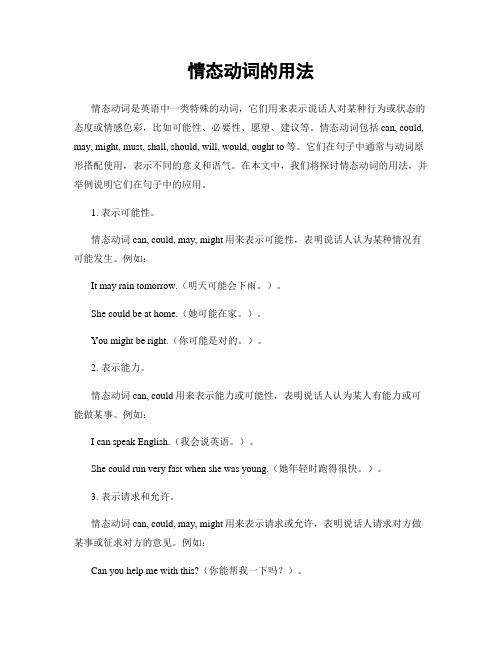
情态动词的用法情态动词是英语中一类特殊的动词,它们用来表示说话人对某种行为或状态的态度或情感色彩,比如可能性、必要性、愿望、建议等。
情态动词包括can, could, may, might, must, shall, should, will, would, ought to等。
它们在句子中通常与动词原形搭配使用,表示不同的意义和语气。
在本文中,我们将探讨情态动词的用法,并举例说明它们在句子中的应用。
1. 表示可能性。
情态动词can, could, may, might用来表示可能性,表明说话人认为某种情况有可能发生。
例如:It may rain tomorrow.(明天可能会下雨。
)。
She could be at home.(她可能在家。
)。
You might be right.(你可能是对的。
)。
2. 表示能力。
情态动词can, could用来表示能力或可能性,表明说话人认为某人有能力或可能做某事。
例如:I can speak English.(我会说英语。
)。
She could run very fast when she was young.(她年轻时跑得很快。
)。
3. 表示请求和允许。
情态动词can, could, may, might用来表示请求或允许,表明说话人请求对方做某事或征求对方的意见。
例如:Can you help me with this?(你能帮我一下吗?)。
Could I use your pen?(我可以用一下你的笔吗?)。
May I come in?(我可以进来吗?)。
4. 表示必要性。
情态动词must, should, ought to用来表示必要性或建议,表明说话人认为某种行为是必要的或值得做的。
例如:You must finish your homework before you go out to play.(你必须在出去玩之前完成作业。
)。
You should apologize to her.(你应该向她道歉。
14个情态动词及其用法

14个情态动词及其用法14个情态动词及其用法如下:1.can:表示能力,用于疑问句或否定句中表示惊异、怀疑、不相信等态度。
如:Can you speak English?你会说英语吗?2.could:表示过去的能力或可能性。
表示惊异、怀疑、不相信等态度时,可用could。
如:Could you have done this?你真的能做到这个吗?3.may:表示可能性。
用于请求、允许、祝愿等场合。
如:May I borr ow your book?我能借你的书吗?4.might:表示可能性,比may更委婉。
如:Might I have your attenti on,请大家注意。
5.must:表示肯定、确定,用于陈述事实或推测。
如:The game must be over,比赛应该结束了。
6.need:表示需要、必要性。
如:We need to finish this task today。
我们今天需要完成这个任务。
7.ought to:表示应该、应当,用于表示道义上的责任或推测。
如:Yo u ought to help him,你应当帮助他。
8.dare:表示勇气、敢。
如:Dare you jump off the bridge?你敢从桥上跳下去吗?9.shall:表示询问、承诺、威胁等。
如:Shall we start?我们开始吗?10.will:表示将来、意愿、决心等。
如:I will finish this work on ti me.我会按时完成这个工作。
11.had better:表示建议、警告。
如:You had better hurry,你最好快点。
12.have to:表示被迫、必须。
如:I have to go to work,我必须去上班。
ed to:表示过去经常发生的动作或状态,也可表示习惯或倾向。
如:He used to smoke,他过去经常抽烟。
14.shouldn't:表示不应该,用于否定句中表示建议、批评等。
情态动词的用法
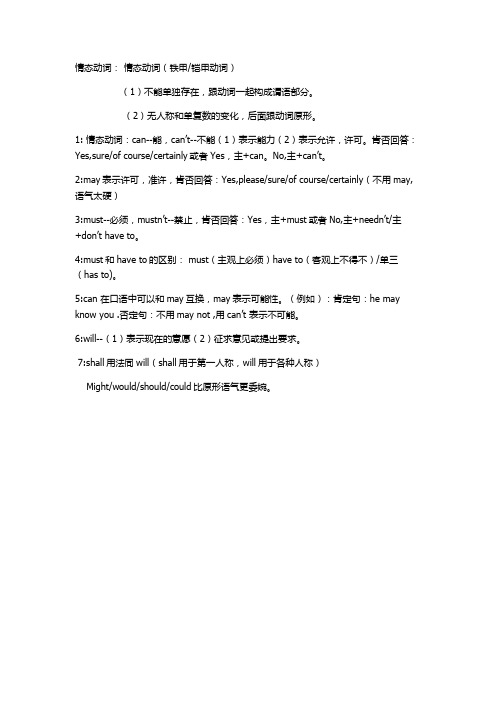
情态动词:情态动词(铁甲/铠甲动词)
(1)不能单独存在,跟动词一起构成谓语部分。
(2)无人称和单复数的变化,后面跟动词原形。
1: 情态动词:can--能,can’t--不能(1)表示能力(2)表示允许,许可。
肯否回答:Yes,sure/of course/certainly或者Yes,主+can。
No,主+can’t。
2:may表示许可,准许,肯否回答:Yes,please/sure/of course/certainly(不用may,语气太硬)
3:must--必须,mustn’t--禁止,肯否回答:Yes,主+must或者No,主+needn’t/主
+don’t have to。
4:must和have to的区别: must(主观上必须)have to(客观上不得不)/单三(has to)。
5:can 在口语中可以和may互换,may表示可能性。
(例如):肯定句:he may know you .否定句:不用may not ,用can’t 表示不可能。
6:will--(1)表示现在的意愿(2)征求意见或提出要求。
7:shall用法同will(shall用于第一人称,will用于各种人称)
Might/would/should/could比原形语气更委婉。
情态动词用法

情态动词用法情态动词是英语中的一类特殊动词,用来表示说话人对某种行为或状态的态度、推测、能力、可能性、建议等。
情态动词常常和动词原形搭配使用,具有一些特殊的语法和用法规则。
本文将详细介绍情态动词的基本用法和几种常见的情态动词。
一、情态动词的基本用法1. 表示能力:情态动词可以用来表示能力或技能。
常见的能力情态动词有can和could。
例如:- I can swim.(我会游泳。
)- She could play the piano when she was young.(她小时候会弹钢琴。
)2. 表示可能性:情态动词可以表示某种行为或状态的可能性。
常见的可能性情态动词有may、might和could。
例如:- It may rain tomorrow.(明天可能会下雨。
)- I might go to the party tonight.(我可能会去参加今晚的聚会。
)- He could be late for the meeting.(他可能会迟到会议。
)3. 表示推测:情态动词还可以用来表示说话人对某种事实的推测。
常见的推测情态动词有must、may、might和could。
例如:- He must be tired.(他一定很累。
)- They may be on vacation.(他们可能在度假。
)- She might have forgotten her keys.(她可能忘记带钥匙了。
)- It could snow tonight.(今晚可能会下雪。
)4. 表示允许和禁止:情态动词还可以表示某种行为的允许或禁止。
常见的允许情态动词有can、may和could,常见的禁止情态动词有mustn't和shouldn't。
例如:- You can go now.(你现在可以走了。
)- May I borrow your pen?(我可以借用你的钢笔吗?)- You mustn't smoke here.(你不能在这里抽烟。
情态动词用法归纳(全)
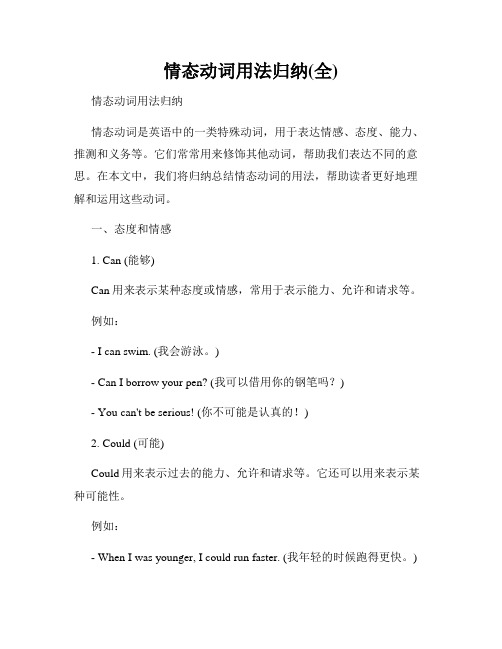
情态动词用法归纳(全)情态动词用法归纳情态动词是英语中的一类特殊动词,用于表达情感、态度、能力、推测和义务等。
它们常常用来修饰其他动词,帮助我们表达不同的意思。
在本文中,我们将归纳总结情态动词的用法,帮助读者更好地理解和运用这些动词。
一、态度和情感1. Can (能够)Can用来表示某种态度或情感,常用于表示能力、允许和请求等。
例如:- I can swim. (我会游泳。
)- Can I borrow your pen? (我可以借用你的钢笔吗?)- You can't be serious! (你不可能是认真的!)2. Could (可能)Could用来表示过去的能力、允许和请求等。
它还可以用来表示某种可能性。
例如:- When I was younger, I could run faster. (我年轻的时候跑得更快。
)- Could I ask you a question? (我可以问你一个问题吗?)- It could rain later, so bring an umbrella. (今天后面可能会下雨,所以带上雨伞。
)3. May (可能)May常表示许可、请求和推测等。
它还可以用来表示某种可能性或希望。
例如:- May I use your phone? (我可以用一下你的手机吗?)- It may rain tomorrow. (明天可能会下雨。
)- They may arrive late. (他们可能会迟到。
)4. Might (可能)Might与may的用法类似,但表示的可能性稍微低一些。
例如:- She might be busy. (她可能很忙。
)- I might go to the party, but I'm not sure yet. (我可能会去参加派对,但我还不确定。
)二、能力和推测1. Must (必须)Must用来表示强烈的推断或必要性。
情态动词主要用法总结
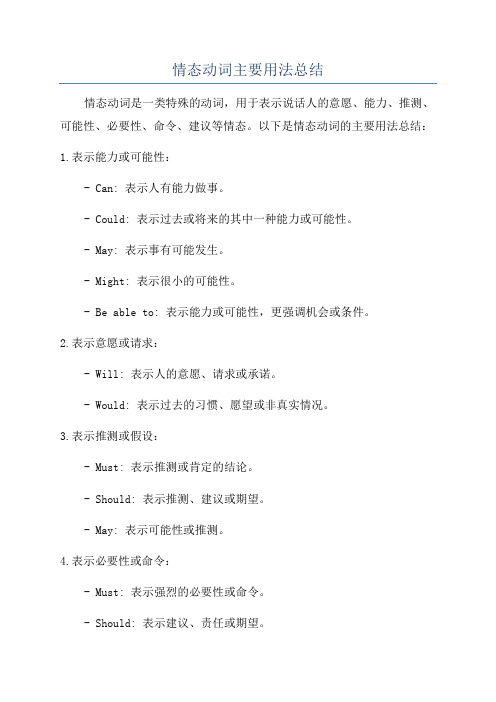
情态动词主要用法总结
情态动词是一类特殊的动词,用于表示说话人的意愿、能力、推测、可能性、必要性、命令、建议等情态。
以下是情态动词的主要用法总结:1.表示能力或可能性:
- Can: 表示人有能力做事。
- Could: 表示过去或将来的其中一种能力或可能性。
- May: 表示事有可能发生。
- Might: 表示很小的可能性。
- Be able to: 表示能力或可能性,更强调机会或条件。
2.表示意愿或请求:
- Will: 表示人的意愿、请求或承诺。
- Would: 表示过去的习惯、愿望或非真实情况。
3.表示推测或假设:
- Must: 表示推测或肯定的结论。
- Should: 表示推测、建议或期望。
- May: 表示可能性或推测。
4.表示必要性或命令:
- Must: 表示强烈的必要性或命令。
- Should: 表示建议、责任或期望。
- Have to: 表示客观上的必要性。
5.表示允许或禁止:
- Can: 表示人被允许做事。
- May: 表示人有许可或请求。
- Must not: 表示禁止做事。
6.表示习惯、忠告或规定:
- Should: 表示习惯、忠告或规定。
- Ought to: 表示强烈的建议或道义上的责任。
情态动词的用法具有一定的灵活性,其意义和用法还会受上下文的影响。
特别是在否定和疑问句中,情态动词的用法和意义可能会有所变化。
因此,对于情态动词的深入理解需要通过大量的阅读和实践来逐渐掌握。
情态动词的用法及常见情态动词

情态动词的用法及常见情态动词情态动词是英语中一类特殊的动词形式,用来表示说话人对某个行为或状态的态度、推测、能力、可能性等。
它在句子中主要用来表达说话人的意愿、能力、推测以及可能性等语气。
下面将介绍情态动词的用法以及一些常见的情态动词。
一、情态动词的用法1. 表示能力:can, could, be able to情态动词can和be able to都表示能力。
can通常表示现在的能力,而be able to更强调一种可能性和解决问题的能力。
例如:- I can swim.(我会游泳。
)- She was able to solve the problem by herself.(她能够自己解决这个问题。
)2. 表示许可:may, can, could情态动词may, can, could都可以表示许可的意思。
may较正式,用于请求许可;can较口语化,表示一种可能性;could则表示一种客气委婉的许可。
例如:- May I use your computer?(我可以使用你的电脑吗?)- Can I have another piece of cake, please?(请再给我一块蛋糕好吗?)3. 表示推测:must, may, might情态动词must表示说话人对某个事实的肯定推测;may和might则表示可能性。
may较肯定,而might较委婉。
例如:- He must be tired, as he worked all day.(他一定很累,因为他整天都在工作。
)- She may/might be late.(她可能会迟到。
)4. 表示必须:must, have to情态动词must表示说话人对某个行为的强制性要求;have to则表示客观上的必须。
例如:- You must finish your homework before you go out.(你必须在出门前完成作业。
)- I have to go to work tomorrow.(我明天必须去上班。
情态动词的用法
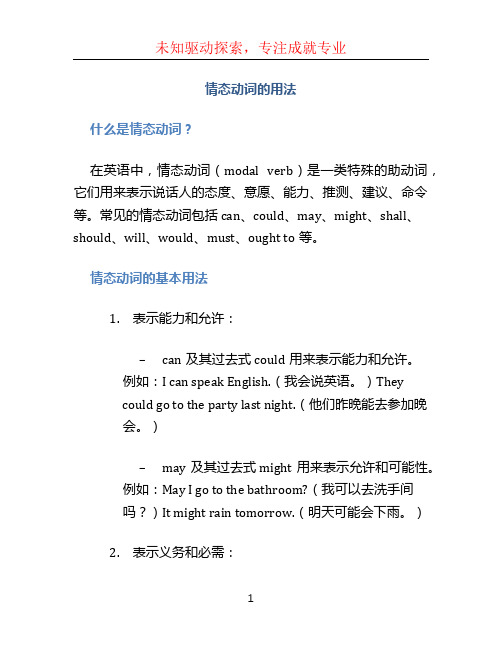
情态动词的用法什么是情态动词?在英语中,情态动词(modal verb)是一类特殊的助动词,它们用来表示说话人的态度、意愿、能力、推测、建议、命令等。
常见的情态动词包括can、could、may、might、shall、should、will、would、must、ought to等。
情态动词的基本用法1.表示能力和允许:–can及其过去式could用来表示能力和允许。
例如:I can speak English.(我会说英语。
)Theycould go to the party last night.(他们昨晚能去参加晚会。
)–may及其过去式might用来表示允许和可能性。
例如:May I go to the bathroom?(我可以去洗手间吗?)It might rain tomorrow.(明天可能会下雨。
)2.表示义务和必需:–must用来表示义务和必需。
例如:You must finish your homework before playing games.(你必须在玩游戏之前完成作业。
)–should用来表示应该和建议。
例如:She should eat more vegetables for her health.(她应该多吃蔬菜保护健康。
)3.表示推测和肯定:–will用来表示未来意愿和不可避免的行为。
例如:I will help you with your presentation.(我会帮你做演讲。
)–would用来表示假设和委婉表达。
例如:If I had more time, I would travel around the world.(如果我有更多时间,我会环游世界。
)情态动词的用法注意事项1.情态动词后接不带to的原形动词,即不加动词的第三人称单数-s形式。
例如:He can swim well.(他游泳游得很好。
)They should study hard.(他们应该努力学习。
情态动词的用法完整详细

情态动词的用法完整详细情态动词定义:情态动词是一种本身有一定的词义,但要与动词原形一起使用,给谓语动词增添情态颜色,表示说话人对有关行为或事物的态度和看法,认为其可能、应当或须要等。
情态动词后面加动词原形。
分类:情态动词有四类:①只做情态动词:must,can(could),may(might),ought to①可做情态动词又可做实义动词:need,dare①可做情态动词又可做助动词:shall(should),will(would)①具有情态动词特征:have(had) to,used to位置:情态动词在句中放在谓语动词之前, 谓语动词前若有助动词,则在助动词之前,疑问句中, 情态动词则在主语之前。
I can see you. Come here.我能看见你,过来吧。
He must have been away.他一定走了。
What can I do for you?我能帮你吗?How dare you treat us like that!你怎能那样对待我们!特点:情态动词无人称和数的变化, 情态动词后面跟的动词需用原形,否定式构成是在情态动词后面加"not"。
个别情态动词有现在式和过去式两种形式, 过去式用来表达越发客气, 委婉的语气, 时态性不强, 可用于过去,现在或未来。
情态动词属非及物动词,故没有被动语态。
情态动词没有非谓语形式,即没有不定式,分词,等形式。
He could be here soon.他很快就来。
We can't carry the heavy box.我们搬不动那箱子。
I'm sorry I can't help you.对不起,我帮不上你。
基本助动词与情态助动词最主要的区分之一是,基本助动词本身没有词义,而情态助动词则有自己的词义,能表示说话人对有关动作或状态的看法,或表示主观设想:What have you been doing since? (构成完成举行体,本身无词义)I am afraid I must be going. (一定要)You may have read some account of the matter. (或许已经)除此之外,情态助动词还有如下词法和句法特征:1)除ought和used以外,其他情态动词后面只能接不带to的不定式。
情态动词的用法
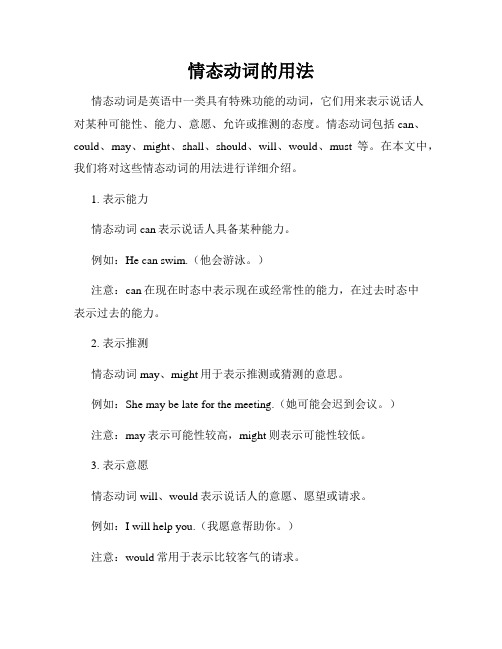
情态动词的用法情态动词是英语中一类具有特殊功能的动词,它们用来表示说话人对某种可能性、能力、意愿、允许或推测的态度。
情态动词包括can、could、may、might、shall、should、will、would、must等。
在本文中,我们将对这些情态动词的用法进行详细介绍。
1. 表示能力情态动词can表示说话人具备某种能力。
例如:He can swim.(他会游泳。
)注意:can在现在时态中表示现在或经常性的能力,在过去时态中表示过去的能力。
2. 表示推测情态动词may、might用于表示推测或猜测的意思。
例如:She may be late for the meeting.(她可能会迟到会议。
)注意:may表示可能性较高,might则表示可能性较低。
3. 表示意愿情态动词will、would表示说话人的意愿、愿望或请求。
例如:I will help you.(我愿意帮助你。
)注意:would常用于表示比较客气的请求。
4. 表示推测的过去情态动词must常用于表示对过去情况的推测或肯定。
例如:He must have missed the bus.(他肯定错过了公交车。
)注意:must用于表示对过去情况的肯定,而might用于表示对过去情况的推测。
5. 表示义务或必要性情态动词must表示对义务、必要性或确定性的肯定。
例如:You must finish your homework.(你必须完成作业。
)6. 表示建议或应该情态动词should表示建议或应该。
例如:You should go to bed early.(你应该早点睡觉。
)注意:should还可以表示对过去情况的推测,例如:He should have arrived by now.(他现在应该已经到达了。
)7. 表示允许或许可情态动词can与may可以用于表示许可或允许。
例如:Can I borrow your pen?(我可以借你的钢笔吗?)8. 表示可能性情态动词could用于表示可能性。
情态动词的用法归纳
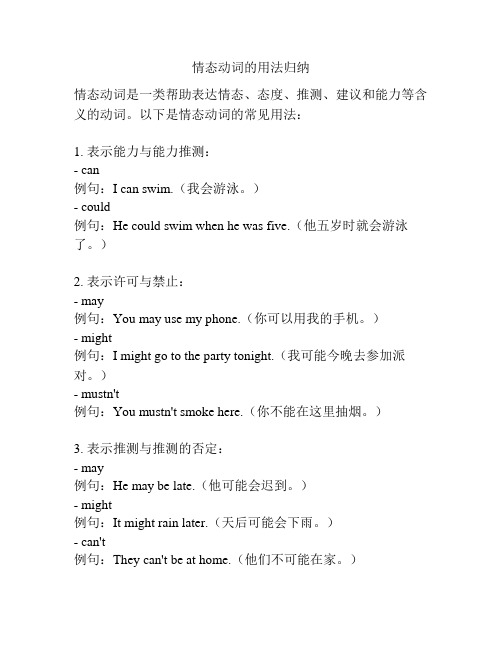
情态动词的用法归纳情态动词是一类帮助表达情态、态度、推测、建议和能力等含义的动词。
以下是情态动词的常见用法:1. 表示能力与能力推测:- can例句:I can swim.(我会游泳。
)- could例句:He could swim when he was five.(他五岁时就会游泳了。
)2. 表示许可与禁止:- may例句:You may use my phone.(你可以用我的手机。
)- might例句:I might go to the party tonight.(我可能今晚去参加派对。
)- mustn't例句:You mustn't smoke here.(你不能在这里抽烟。
)3. 表示推测与推测的否定:- may例句:He may be late.(他可能会迟到。
)- might例句:It might rain later.(天后可能会下雨。
)- can't例句:They can't be at home.(他们不可能在家。
)4. 表示义务与责任:- must例句:We must finish our homework.(我们必须完成作业。
)- have to例句:I have to go to work early tomorrow.(我明天必须早点去上班。
)5. 表示愿望与建议:- should例句:You should exercise regularly.(你应该经常锻炼。
)- ought to例句:They ought to help others.(他们应该帮助别人。
)6. 表示推荐与要求:- would like例句:I would like to have a cup of tea.(我想要一杯茶。
)- need例句:You need to finish this report by tomorrow.(你需要在明天之前完成这份报告。
英语中情态动词的用法

情态动词(Modal verbs)是英语中的一类助动词,用于表示说话人的情感、意愿、建议、能力、推测等语气。
常见的情态动词有can、could;
may、might;must;ought;need;dare,dared等。
情态动词的特点:
1.各个情态动词自身都有一定的词义,比如“can”表示能力,“may”
表示可能性等。
2.情态动词不能在句中独立担当谓语,它们必须和动词原形一起
构成谓语。
3.情态动词在句中不受任何人称、性、数变化的影响。
4.情态动词后接的不定式(除ought外)都不带to,即接动词原
形。
情态动词的用法:
1.表示推测和猜测:must表示很有可能发生的事情;may/might
表示可能发生的事情;could表示可能性不如may/might,但是也有可能发生;can’t表示很不可能发生的事情。
2.表示能力和可能性:can表示能力;could表示过去或未来有可
能的能力;may/might表示可能性。
3.表示意愿和建议:would表示意愿;should表示应该做的事情。
4.表示命令和建议:must表示强制性的命令或规定;should表示
建议或推荐。
需要注意的是,情态动词有时也可以和not连用表示否定,例如:can’t,mustn’t,shouldn’t等。
此外,情态动词没有人称和时态的变化。
情态动词的用法

情态动词的用法
情态动词是一种本身有一定的词义,表示语气的单词。
但是情态动词不能独立作谓语,只能和动词原形一起构成谓语。
情态动词用在行为动词前,表示说话人对这一动作或状态的看法或主观设想。
英文中常见的情态动词有:can (could), may (might), must, need, ought to, dare (dared), shall (should), will (would)。
具体用法如下。
1.“情态动词+have+done”结构,表示对过去事情的肯定或否定推测,译成“一定/想必…”。
2.“情态动词+be+V-ing”,表示对现在正在做的事情的肯定或否定推测。
3.“情态动词+have+been+V-ing”,表示对过去一直在做的事的肯定或否定推测。
4.“情态动词+be+V-ed”,表示对被动关系的肯定或否定推测。
5.“情态动词+have+been+V-ed”,表示对过去已经被动的动作的肯定或否定推测。
6.“情态动词+be+to do”,表示对未来的事情的肯定或否定推测。
7.“情态动词+have+done”,表示对过去的动作的肯定或否定推测。
8.“情态动词+be+to be”,表示对现在或未来的状态进行猜测。
9.“情态动词+be+to have done”,表示对过去的动作进行猜测。
情态动词的用法总结
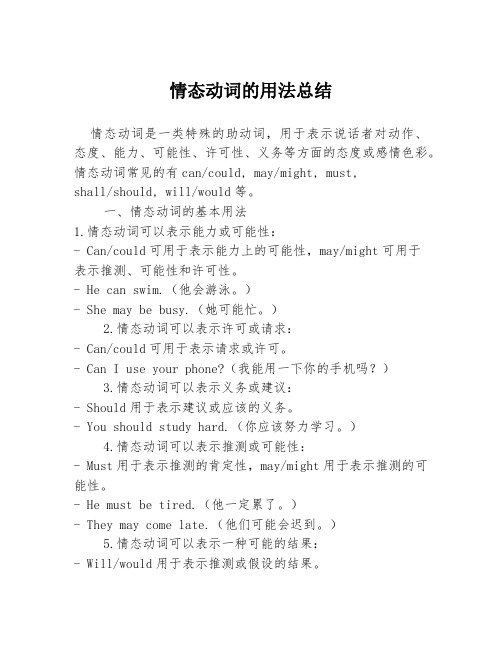
情态动词的用法总结情态动词是一类特殊的助动词,用于表示说话者对动作、态度、能力、可能性、许可性、义务等方面的态度或感情色彩。
情态动词常见的有can/could, may/might, must,shall/should, will/would等。
一、情态动词的基本用法1.情态动词可以表示能力或可能性:- Can/could可用于表示能力上的可能性,may/might可用于表示推测、可能性和许可性。
- He can swim.(他会游泳。
)- She may be busy.(她可能忙。
)2.情态动词可以表示许可或请求:- Can/could可用于表示请求或许可。
- Can I use your phone?(我能用一下你的手机吗?)3.情态动词可以表示义务或建议:- Should用于表示建议或应该的义务。
- You should study hard.(你应该努力学习。
)4.情态动词可以表示推测或可能性:- Must用于表示推测的肯定性,may/might用于表示推测的可能性。
- He must be tired.(他一定累了。
)- They may come late.(他们可能会迟到。
)5.情态动词可以表示一种可能的结果:- Will/would用于表示推测或假设的结果。
- If it rains, we will stay indoors.(如果下雨了,我们就呆在室内。
)二、情态动词的注意事项1.情态动词没有人称和数的变化,后面直接跟动词原形。
- He can play the piano.(他会弹钢琴。
)2.情态动词后面的动词一般用原形,表示动作和状态。
- I can swim.(我会游泳。
)- They should apologize.(他们应该道歉。
)3.情态动词用于疑问句时,直接将情态动词置于句首。
- Can you swim?(你会游泳吗?)4.情态动词用于否定句时,直接在情态动词前加"not"。
情态动词的用法总结

情态动词的用法总结情态动词是英语中一类特殊的动词,它们不表示动作,而是表示说话者对动作的态度,如肯定、否定、表示推测或可能性等。
在英语的语法结构中,情态动词占有重要的地位,并且在日常会话中比较常用。
下面就介绍一下情态动词的用法。
一、can的用法can最常见的用法是表示能力,即表示能够做某事,如:I can speak Chinese.我会说汉语。
也可以表示请求、允许或可能性,如:Can I borrow your pen?我可以借你的钢笔吗?Can we start the meeting now?我们现在可以开始开会吗?It can rain tomorrow.明天可能会下雨。
二、should的用法should表示建议、劝告或命令,如:You should read more books.你应该多读书。
You should not lie to your parents.你不应该对父母撒谎。
三、must的用法must表示必须,强调事情是不可以不做的,如:You must turn off the lights before leave the room.你离开房间之前必须关掉灯。
四、ought to的用法ought to相当于should,表示应该或建议,如:You ought to finish your homework before watching TV.你应该在看电视前把作业做完。
五、would的用法would常用来礼貌地表达请求、愿望或建议,如:Would you like a cup of tea?你想来杯茶吗?Would you like to go to the movies with me?你想和我一起看电影吗?六、could的用法could常用来表示可能性,也可以用来礼貌地表达请求,如: The weather could get worse later.天气以后可能会变得更糟糕。
情态动词的用法
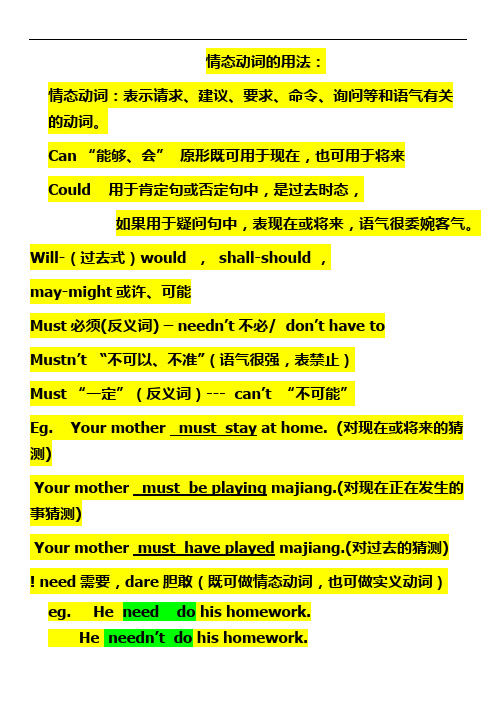
情态动词的用法:
情态动词:表示请求、建议、要求、命令、询问等和语气有关
的动词。
Can “能够、会”原形既可用于现在,也可用于将来
Could 用于肯定句或否定句中,是过去时态,
如果用于疑问句中,表现在或将来,语气很委婉客气。
Will-(过去式)would , shall-should ,
may-might或许、可能
Must必须(反义词) – needn’t不必/ don’t have to
Mustn’t “不可以、不准”(语气很强,表禁止)
Must “一定”(反义词)--- can’t “不可能”
Eg. Your mother must stay at home. (对现在或将来的猜测)
Your mother must be playing majiang.(对现在正在发生的事猜测)
Your mother must have played majiang.(对过去的猜测)
! need需要,dare胆敢(既可做情态动词,也可做实义动词)eg. He need do his homework.
He needn’t do his homework.
Need/dare做情态动词:无人称和数变化;后接动原;
否定句直接后加not;
He needs to do his homework.
He doesn’t need to do his homework.
Need/dare做实意动词:有人称和数变化;后接to do;
否定句前加助动词+not.。
情态动词的用法总结

情态动词的用法总结情态动词是一类特殊的动词,用来表示说话人对其中一种行为、状态或可能性的态度、判断、推测、愿望等情态。
情态动词有can,could,may,might,will,shall,should,would,must等。
它们在语法上有一些特殊的用法和用法限制。
以下是情态动词的用法总结:1.表示能力和许可:- Can/could:用来表示能力,做事的方式上拥有能力或技能。
例如:I can swim.(我会游泳。
)- May/might:用来表示允许或许可。
例如:May I go to the bathroom?(我可以去洗手间吗?)- Will/would:用来表示请求或许可。
例如:Would you please close the door?(你能关门吗?)2.表示推测和可能性:- May/might:用来表示推测、猜测或可能性。
例如:He may be at home.(他可能在家。
)- Could:用来表示一种可能性或假设的情况。
例如:He could bein the park.(他可能在公园。
)3.表示义务和必要性:- Must:用来表示义务、必要性或推测。
例如:You must finish your homework.(你必须完成作业。
)- Should:用来表示建议、责任或推测。
例如:You should apologize for your behavior.(你应该为你的行为道歉。
)4.表示愿望和偏好:- Would:用来表示过去或不太可能实现的愿望或偏好。
例如:I would love to go on vacation.(我很想去度假。
)需注意的是,情态动词具有一些特殊的用法和词语组合,例如情态动词后接动词原形、后接动词不定式的完成式形式等。
使用情态动词时需要根据具体语境和句子结构进行合理搭配与运用。
- 1、下载文档前请自行甄别文档内容的完整性,平台不提供额外的编辑、内容补充、找答案等附加服务。
- 2、"仅部分预览"的文档,不可在线预览部分如存在完整性等问题,可反馈申请退款(可完整预览的文档不适用该条件!)。
- 3、如文档侵犯您的权益,请联系客服反馈,我们会尽快为您处理(人工客服工作时间:9:00-18:30)。
情态动词的用法常见的情态动词:1). Must、can、could、may、might2). Shall、should、ought to、dare3). Will、would4). Need1. must1) 必须; 表示必要或很重要2)一定; 表示对现在的肯定推测3)应该; 表示提议E.g When you enter the building, you must show the guard your pass.(强调必要性)Y ou must be tired after your long journey. (肯定推测)Y ou must read this story because it’s funny. (建议或提议)2. can/ could1) 有时候会,时而可能; 表示常有的行为或情形2) 不可能;用于否定句,表推测3) 竟然能,难道会,怎么能;表疑惑或惊讶4) 能,会;表有能力,能够5) 可以;表允许或请求或建议6)必须;表示对方必须做,尤其指说话人在生气的时候E.g It can be windy on the top of the montain, especially in winter.That can’t be Bohu, he is in the room of Qiuxiang. (推测)How can you be so rude! (惊讶)I can figure out this qustion easily. (能力)Y ou can borrow some books from the library. (允许)Can I use your pen? (请求)W e can go swimming, if you like. (建议)If you won’t keep quiet, you can get out here.3. may/ might1) 也许,可能,但不确定2) 可以:征求意见或允许3) 可以:礼貌地评价或提问等E.g He may be right. (但也有可能错)May I use your pen. (征求意见)May I ask how you finished your work on time.( 提问)4. shall1) 用于一、三人称疑问句,表征求对方意见2) 用于二、三人称陈述句,表决心,允诺,命令,警告等E.g What shall we do this weekend? (征求意见)Don’t worry, you shall get the answer this afternoon. (允诺)When she comes in, nobady shall says a word. (命令)5. should1) 应该;用于纠正别人/ 劝告2) 该;用于征求建议3) 应该会/ 可以;表示预期4) 本应;表示与预期相反(虚)5) 竟然;用于许多表示感情的adj 后的that-从句中,表示惊讶、失望、愤怒、惋惜、欢心等6) 用于why、how、who、what should sb/sth do…句型,表示拒绝、惊讶、恼怒E.g Y ou should keep your promise. (纠正)Should I call him and apologize. (征求意见)They should arrive at noon. (预期)It should be snowing now, according to the weather forecasting. (虚)I’m surpised that he should eat so little every day. (惊讶)Why should I help him? He’s never done anything fot me.(不高兴)6. ought to1) 和should 用法基本一致(should 用法中的1)、2)、3))2) 应该;表示义务或责任E.g I know I ought to bring up my kids well. (责任)7. dare1) 敢;做情态动词时,多用于否定句、疑问句、条件句中2) 敢;做实义动词时,在肯定句中必须和不定式to连用(dare to do);在否定句或疑问句中可省略to。
E.g I dare not mention their names.Dare we tell her the truth?If he dare come here, I will go.Only he dares to tell the truth.He dares (to) say anthing.8. will/ would1) 愿,要,会;表示愿意2) 是否愿意…,…好吗;烦劳别人时的用语3) 总是;表示习惯4) 叙述在某种情况下是有可能的事情或真事5) 叙述一般真理6) 可能,该是;含有肯定的意思E.g I will help you if you need me. (愿意)Will you help me? (麻烦别人时用语)She will listen to music for hours when alone in her room. (习惯)The shop will not open before 9 o’clock.Heated, water will change to vapor. (真理)This will be the house we’re looking for.9. need 需要E.g Y ou needn’t complete the essay tonight.----Need you go now? 你现在得走?----Y es, I must. No, I needn’t. 是,我现在得走;不,我不必现在走----Must I go now?----No, you needn’t 注意:这个时候不用mustn’t (表禁止)特殊用法1)Can’t but do sth 不得不/ 只好做sthE.g I can’t but choose this book2) may/ might well 完全能,很可能E.g Her appearance has changed so much that you may well not recognize her.3) may/ might as well 最好,倒不如E.g Y ou may as well do it at once.4) can’t / never 等否定意义的词和enough/ too 连用,再…也不为过E.g Y ou can’t be careful enough in the street.5) may 可用于祈使句,表祝愿E.g May we never forget each other.习题1.I can’t leave. She told me that I_______stay here until she comes back.A. canB. mustC. willD. may2. One of the few things you_______say about English people with certainty is that they talk a lot about the weather.A. needB. mustC. shouldD. can3. What do you mean, there are only ten tickets? There___be twelve.A. shouldB. wouldC. willD. shall4. ----Hi, Xiaqiang. Any idea where Qiuxiang is ?----She______in the classroom. I saw her there just now.5. The traffic is heavy these days. I ______arrive a bit late, so could you save mea place.A. canB. mustC. needD. might6. ----What sort of house do you want to have? Something big?----W ell, it_______be big-----that’s not important.7. That he_____speak to you like that is quite astonishing.A. couldB. mustC. wouldD. should8. ----How’s your tour around the North Lake? Is it beautiful?----It______be, but it is now heavily polluted.A. willB. wouldC. shouldD. must9. The boss has given everyone a special holiday, so we____go to work tomorrow.A. can’tB. mustn’tC. needn’tD. shouldn’t10. ----Turn off the TV, Jack. ______your homework now?----Mum, just ten more minutes, please.A. Should you be doingB. Shouldn’t you be doingC. Couldn’t you be doingD. Will you be doing。
